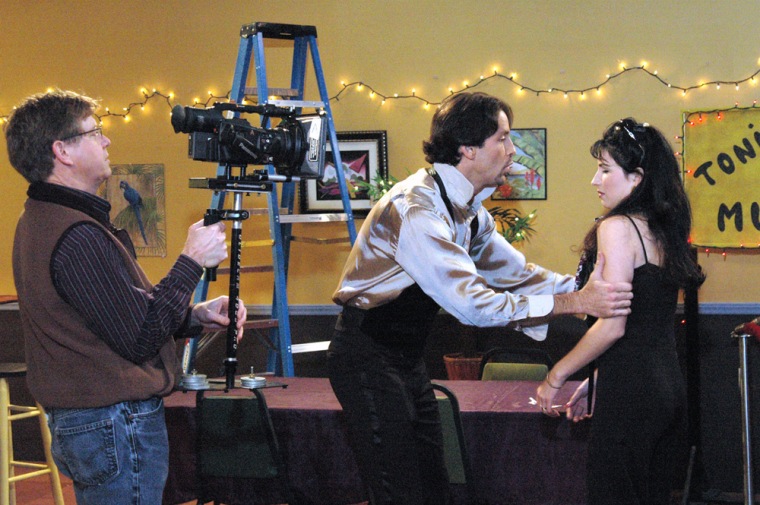After a successful first season, the creator of a unique Spanish-language soap opera that mixes educational themes for immigrants with the more traditional telenovela plots of love and betrayal hopes to start production on a second season in August.
“We kind of stepped in on something that was getting ready to happen,” producer and director Dilsey Davis said of Americans’ burgeoning interest in telenovelas. “We kind of came at the right moment.”
An actress who also has a master’s in public health, Davis came up with the idea for “Nuestro Barrio” as part of her job at a community advocacy group in Durham that is producing the show. A pilot focused on fair housing issues aired in April 2004 on cable stations in North Carolina, and the response — combined with the wild success of telenovelas in the United States on Spanish-language networks such as Univision and Telemundo — convinced Davis the format could become an excellent financial classroom for first-generation Hispanic immigrants.
“You have your cute girls,” Davis said. “But our show is more family focused. Hopefully, people will appreciate that. As one of our tag lines says, ‘Nuestro Barrio: Not your typical soap opera,’ and it’s not. We do have girls that look cute ... but we hope it’s the story line that draws you in and not necessarily seeing someone naked.”
In season one, lessons about fair housing and how to open a checking account were mixed in between the tales of jealousy and romance between restaurateurs Manuel and Marisol Diaz, and their archrival, bar owner Salvador. Davis worried about every script of “Nuestro Barrio” — or “Our Neighborhood” — wondering if she’d found the right balance of teaching moments and the fun stuff: love, deceit and betrayal.
“I fell in love with it within 30 seconds,” said Rafael Ortiz-Guzman, the chief executive officer of Georgia TeVe, a Spanish-language station in Atlanta, which plans to air the first season starting in September.
“I felt it really commanded such a wealth of education that is so important to a community that constantly, constantly gets taken,” Ortiz-Guzman said. “This particular show addresses a lot of the issues that are the real issues of their everyday life.”
More than half of Mexican immigrants living in the U.S. and a third of American-born Hispanic residents lack bank accounts, according to 2000 figures from the U.S. Census Bureau.
Show has ‘teaching’ focus
Spoken in Spanish with English subtitles, the show is set in an unnamed, medium-sized U.S. city. Filmed on location and at a Durham warehouse, the show features local actors performing a script translated from English into Spanish. The first season aired in Raleigh/Durham market, as well as on stations in Charlotte, Asheville and Myrtle Beach, S.C. Davis hopes to sign a deal with a distributor so she won’t have to knock on television station doors to find air time.
“It’s not only entertaining, but it’s also educational and informational,” said Neal Davis, the general manager of WLFL-TV in Raleigh, which aired the first 13-episode season and plans to air the second. “When introducing them to other general managers, I’m giving them credit for doing something other shows don’t.”
The show’s initial “teaching” focus was on financial issues — the mission of Davis’ group, the Community Reinvestment Association of North Carolina, is to promote community wealth by advocating on several issues, including payday lending, fair housing and home ownership. In season two, Davis wants to focus on domestic violence, workplace safety and drunken driving.
“This is an extremely vulnerable community and not an easy community to reach,” said Lisa Navarette, vice president of the National Council of La Raza, the nation’s largest Hispanic civil rights and advocacy organization. “This is an innovative way to impart information that will resonate with people.”
Telenovelas, which typically run for three to six months instead of decades on end common to American soaps, are immensely popular in Latin America. In the United States, several of Univision’s telenovelas have drawn bigger ratings than did NBC’s telecasts of this year’s NHL Stanley Cup finals.
Using a telenovela to communicate with a large number of immigrants isn’t without critics.
'Parallel national culture'
While immigrants have always had their own popular culture, this is the first time in American history that the vast majority immigrants have come from a single foreign language community, said Mark Krikorian, the head of a think-tank that supports tighter controls on immigration. “Nuestro Barrio” has a far broader reach than the small newspapers that dot immigrant neighborhoods in big cities; it demonstrates the potential for the creation of a “parallel national culture,” he said.
“This one series is not going to be the end of the world,” said Krikorian, the executive director of the Center for Immigration Studies in Washington, D.C. “But it could indicative of where we’re going.”
It’s an idea the creator of “Nuestro Barrio” rejects.
“Our focus is on multiculturalism and the importance of it and why it’s needed and why this person is just a person,” Davis said. “So if we could see the connectedness and stop saying there’s a language barrier and so that person is different. ... It’s just a language.”
